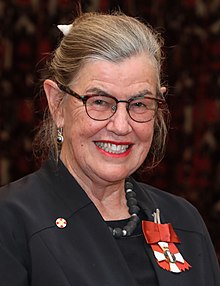Career
Howden-Chapman started her career in secondary-school teaching, before moving to clinical psychology, and then public health.
She has conducted a number of high-profile randomised control trials into various aspects of housing and health, in the process helping to build the evidence base for the later New Zealand-wide insulation programme. Howden-Chapman's Healthy Housing group conducted an analysis of the Warm Up New Zealand: Heat Smart programme which showed that overall it "will have a net benefit of $951 million dollars, and a highly favourable benefit cost ratio of 3.9:1." [8]
Howden-Chapman was a member of the 2012 Expert Advisory Group on Solutions to Child Poverty, which outlined a number of policy recommendations to tackle child poverty in New Zealand. [9]
In December 2014, Howden-Chapman and her research programme were awarded the $500,000 Prime Minister's Science Prize. She was the first woman and the first social scientist to win the prize. [4] [10]
Howden-Chapman is the chair of the WHO Housing and Health Guideline Development Group. [6] She is also director of He Kāinga Orana, the Housing and Health Research Programme examining the link between housing quality and health, based in the University of Otago, New Zealand. [11] With a strong interest in reducing inequalities in the determinants of health, Howden-Chapman's research aims to identify and evaluate housing-related interventions to improve individual, family and community health. [11] Her research has had a major influence on housing, health and energy policy in New Zealand. [6]
Recognition
In the 2009 New Year Honours, Howden-Chapman was appointed a Companion of the Queen's Service Order, for services to public health. [12]
In November 2013, Howden-Chapman was made a fellow of the Royal Society of New Zealand. [13] [14]
In 2017, Howden was selected as one of the Royal Society Te Apārangi's "150 women in 150 words", celebrating the contributions of women to knowledge in New Zealand. [15]
Howden-Chapman was named the Supreme Winner of NEXT Woman of the Year 2018 for her advocacy for healthy, warm and dry homes in New Zealand. [16]
In October 2019, Howden-Chapman was appointed one of seven inaugural sesquicentennial distinguished chairs, or poutoko taiea, at Otago University. [17]
In the 2021 New Year Honours, Howden-Chapman was appointed a Companion of the New Zealand Order of Merit, for services to public health. [18] She was awarded the 2021 Rutherford Medal for her healthy housing research. [19]
This page is based on this
Wikipedia article Text is available under the
CC BY-SA 4.0 license; additional terms may apply.
Images, videos and audio are available under their respective licenses.
